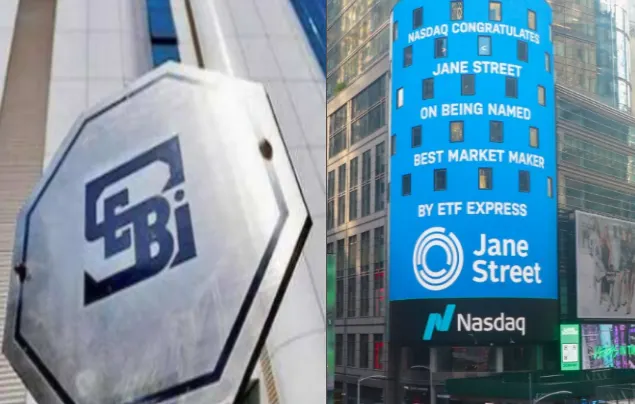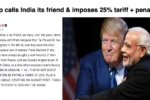The Securities and Exchange Board of India (SEBI) has launched a major crackdown on Jane Street Group, a global quantitative trading powerhouse, by banning it from the Indian securities market and impounding a substantial amount of funds for alleged market manipulation. This is a significant and high-intensity move by the Indian regulator, sending a strong message about market integrity.
Details of the SEBI Ban on Jane Street:
- Date of Order: SEBI issued an interim order on Thursday, July 3, 2025.
- Prohibition: Jane Street Group and its associated entities are restrained from accessing the Indian securities market. This means they are prohibited from buying, selling, or otherwise dealing in any securities, directly or indirectly, in India.
- Allegation: Market Manipulation: SEBI’s core accusation is that Jane Street engaged in market manipulation in a “complex and illegal manner.” The investigation specifically points to their trading activities, particularly in index options, and alleges that they artificially influenced the Nifty 50 index and an index of 12 of India’s largest banks to profit from their positions.
- Impounding of Funds: In a highly impactful move, SEBI has ordered the impounding of ₹4,843 crore (approximately $570 million) from Jane Street. This amount is considered the “unlawful gains” the firm allegedly made from its manipulative trading practices. Jane Street has been directed to open an escrow account in an Indian bank and deposit this amount.
- Account Freeze: Banks where Jane Street entities hold accounts have been instructed to freeze debits from these accounts without SEBI’s prior permission.
- Position Closure: Jane Street and its entities must close or square off all open positions within three months or by the expiry of the respective contracts, whichever is earlier.
- Continued Investigation: This is an interim order, implying that the investigation is ongoing. SEBI is expected to pass a final order after reviewing further submissions and assessing the market impact.
- Warnings Ignored: SEBI noted that Jane Street allegedly continued engaging in large index option trades even after the National Stock Exchange (NSE) issued a caution letter to them in February 2025, warning them against trading patterns that were prima facie fraudulent and manipulative.
- Profits from Indian Market: Reports indicate that Jane Street earned over $2.3 billion in net revenue from Indian equity derivatives in 2024, highlighting the significance of the Indian market to their global operations.
Intensity and Impact:
The SEBI ban on Jane Street is of high intensity and carries significant impact for several reasons:
- Direct Financial Hit: The impounding of ₹4,843 crore is a massive financial blow. It’s not just a fine but a seizure of alleged ill-gotten gains, demonstrating SEBI’s resolve to recover funds from manipulative activities.
- Reputational Damage: For a global quantitative trading firm like Jane Street, known for its sophistication and algorithmic prowess, an outright ban and allegations of market manipulation from a major regulator like SEBI represent a severe blow to its reputation and credibility worldwide. This could impact their ability to operate or attract talent in other markets.
- Loss of a Lucrative Market: India’s derivatives market, especially index options, is one of the most active and profitable globally. Jane Street’s reported $2.3 billion in revenue from this segment in 2024 underscores its importance. Being completely barred from this market means a significant loss of revenue stream and a strategic retreat from a key emerging market.
- Market Liquidity Impact: Jane Street is a major market maker. Their forced exit from the Indian market, particularly in equity derivatives, is expected to impact market liquidity and pricing. There might be a temporary increase in volatility as other market participants adjust to their absence.
- Regulatory Message: This move sends a strong, unequivocal message to all domestic and foreign trading firms operating in India: market manipulation will not be tolerated, and SEBI is prepared to take stringent enforcement action against even the largest and most sophisticated players. It underscores SEBI’s commitment to maintaining the integrity, fairness, and transparency of the Indian securities market.
- Increased Scrutiny on HFT and Algo Trading: The investigation and subsequent ban will likely lead to increased scrutiny and tighter regulations on high-frequency trading (HFT) and algorithmic trading strategies in India. Other quantitative firms might face enhanced monitoring, and SEBI may introduce new rules to prevent similar alleged manipulations.
- Precedent Setting: This is one of SEBI’s most high-profile actions against a foreign trading firm. It sets a significant precedent for future enforcement against global entities operating in India.
- Internal Impact on Jane Street: Beyond the financial and market implications, the ban will force Jane Street to re-evaluate its India strategy and potentially its global compliance frameworks. It could also lead to internal reviews and changes within the firm regarding their trading practices and risk management.
In summary, the SEBI ban on Jane Street is not merely a procedural step; it’s a decisive regulatory action with substantial financial, operational, and reputational consequences for the firm, and a clear signal of SEBI’s firm stance on maintaining clean and orderly markets in India.
Keep following Duniya Daily for more such important news and updates!










